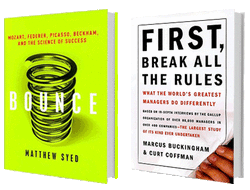
I remember hearing a sermon when I was in university where the minister spoke about the futility of trying to hone gifts outside of our God-given talents. What I most remember, though, was the opposition that this ignited in the non-Christian acquaintance that I spoke with about the sermon. She couldn't believe someone would question the supposed fact that, as humans, we can do anything we put our mind to. During my university years, I was given one other piece of evidence that would concretize the 'God-given' talent theory. It was in Kenisiology 101 where I first heard of fast-twitch and slow-twitch muscles; some people, it turns out, would never be Olympian 100m champions no matter how hard they tried.
Two books recently piqued my interest about talent. One is a management manual, the other a sort of talent-myth exposé. In Buckingham's "First, Break all the Rules", the author argues that for employees to be successful in the workplace, and ultimately for managers to succeed, it must be recognized that there are roles that fit an employees 'filter' and those that don't. He defines talent as "a recurring pattern of thought, feeling, or behaviour that can be productively applied". When it comes to excellence, he claims that "the key to excellent performance is finding the match between your talents and your role", and further that "excellence is impossible without talent". Here he seems to be echoing my early belief that there are innate talents, or at least innate 'filters' that provoke us to certain actions over others. Because they are innately interesting and enjoyable for us to act on, we will flourish by honing them.
Syed, in "Bounce" chooses a different argument. He claims that it is ultimately nurture and not nature that causes certain individuals to succeed in specific acts where others do not. Coining the "Myth of Meritocracy", he states that "practically every man or woman who triumphs against the odds is, on closer inspection, a beneficiary of unusual circumstances", and that "it is practice, not talent that ultimately matters". What makes Syed's argument so convincing is story after story about how exceptional people became just that. In all cases, these exceptional people had received innumerable circumstances to practice and hone a certain skill which the majority of people would never have had. Those who have read Gladwell's "Outliers" will be familiar with a similar argument in the 10,000 hours rule of practice.
It seems to me that both arguments have merit. However, I know from having numerous conversations with many different people over the last few months, that this is a very contentious issue. And rightly so - we all have a view of how we came to be who we are with what talents we believe we have, and a view of how other people have come to be who they are with the talents they exhibit. The issue to me lies in the fact that our philosophical stance here will effect how we treat other people. For example, in a classroom our belief about talent and how students develop talent will effect how we view the student and what pedagogical instruments we employ. Similarly as leaders, the stance that we take about talent will affect how we help (or don't help) our employees and colleagues develop.
My belief hasn't changed that God has created us uniquely and gifts us uniquely. What has changed for me is my understanding of whether or not these gifts are static. Perhaps, depending on the opportunities our parents gave, the methods our teachers have used to teach, and the manner in which our employer regards us all have significant bearing on our formation. Perhaps very different talents may have blossomed through different manifestations of the above scenarios. Really, it's a hypothetical question. However, how we as teachers and leaders serve directly effects those who we serve.
Buckingham, Marcus, and Curt Coffman.First, break all the rules: what the world's greatest managers do differently. New York, NY.: Simon & Schuster, 1999.
Gladwell, Malcolm. Outliers: the story of success. New York: Little, Brown and Co., 2008.
Syed, Matthew. Bounce: Mozart, Federer, Picasso, Beckham, and the Science of Success. New York: Harper, 2010.

 RSS Feed
RSS Feed
